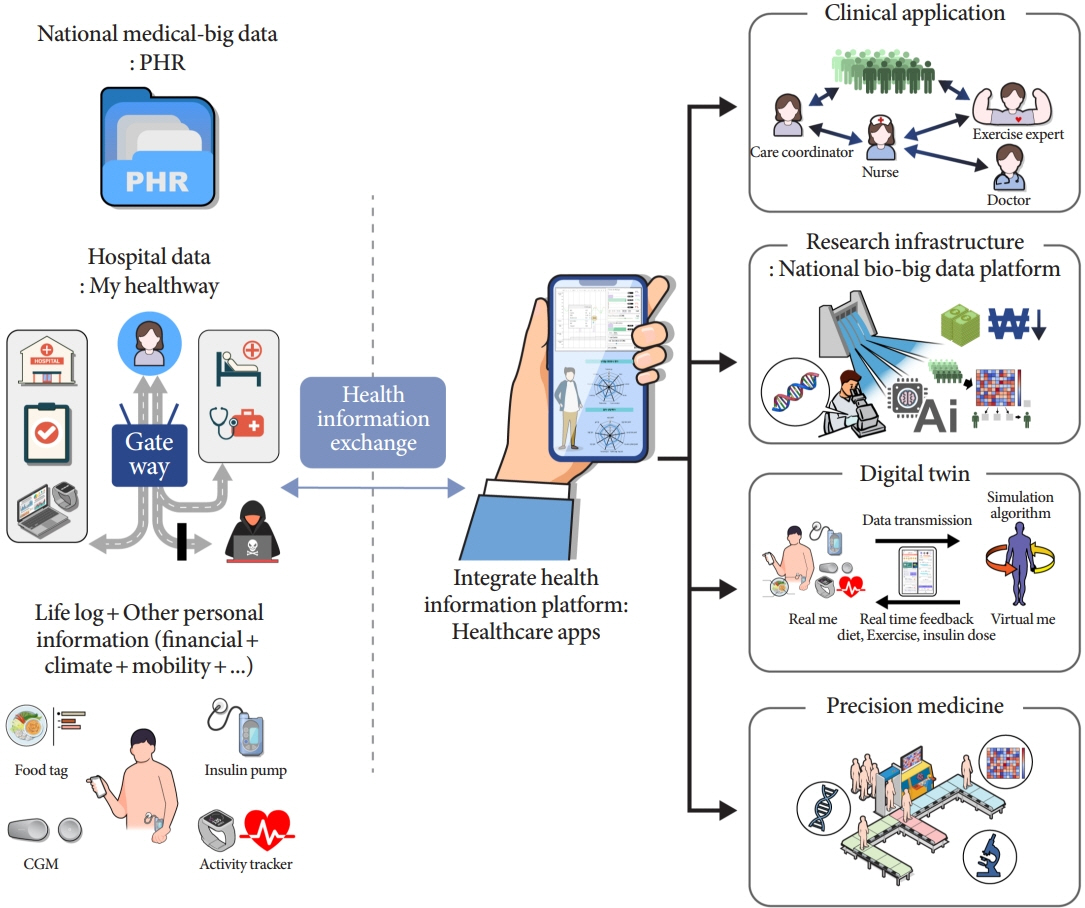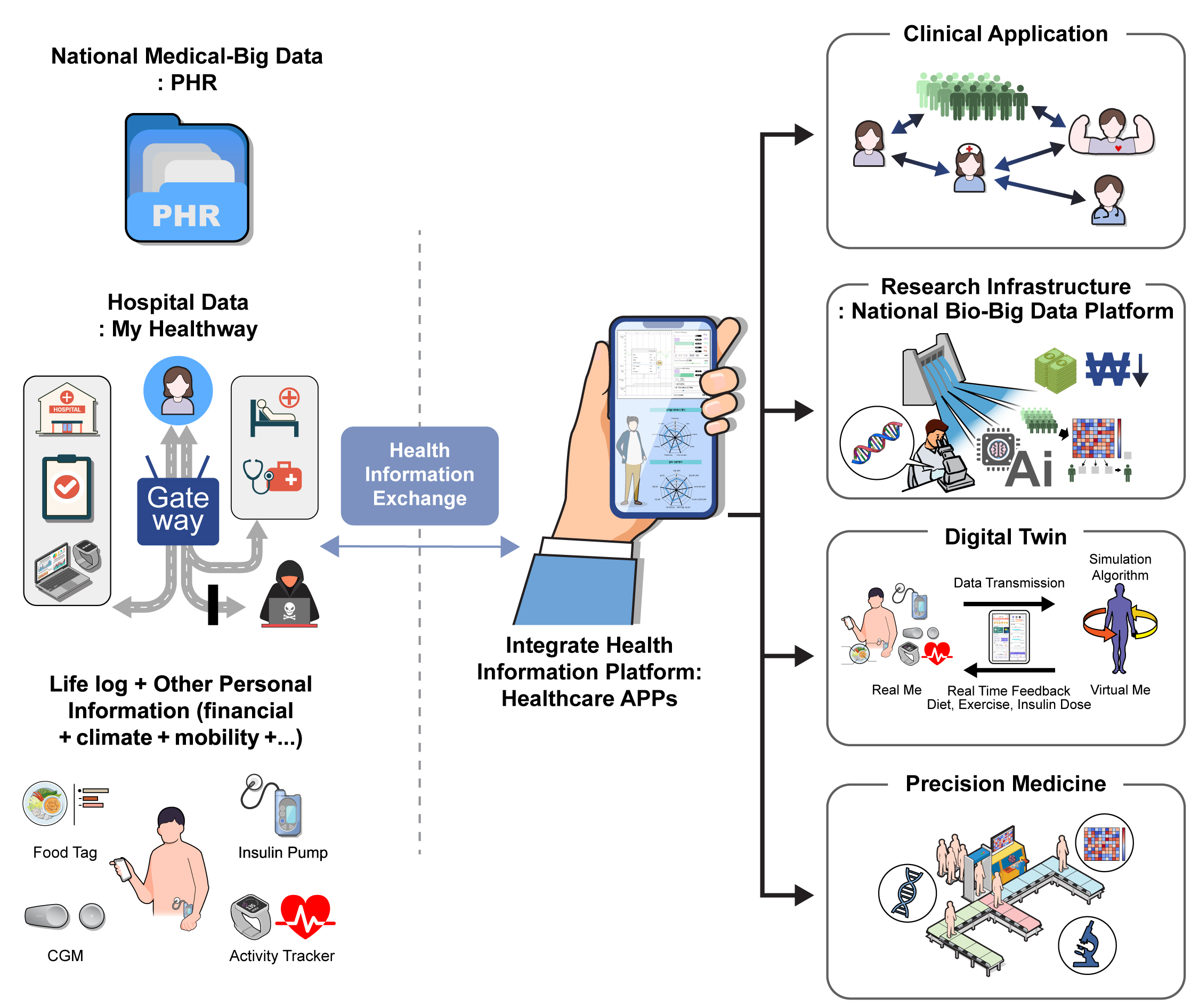Diabetes Metab J.
2023 May;47(3):307-314. 10.4093/dmj.2022.0386.
Opening the Precision Diabetes Care through Digital Healthcare
- Affiliations
-
- 1Division of Endocrinology and Metabolism, Department of Internal Medicine, Seoul St. Mary’s Hospital, College of Medicine, The Catholic University of Korea, Seoul, Korea
- KMID: 2542507
- DOI: http://doi.org/10.4093/dmj.2022.0386
Abstract
- The national healthcare systems of every country in the world cannot sustain the rise in healthcare expenditure caused by chronic diseases and their complications. To sustain the national healthcare system, a novel system should be developed to improve the quality of care and minimize healthcare costs. For 20 years, our team developed patient-communicating digital healthcare platforms and proved their efficacy. National scale randomized control trials are underway to systematically measure the efficacy and economic benefits of this digital health care system. Precision medicine aims to maximize effectiveness of disease management by considering individual variability. Digital health technologies enable precision medicine at a reasonable cost that was not available before. The government launched the “National Integrated Bio-big Data Project” which will collect diverse health data from the participants. Individuals will share their health information to physicians or researchers at their will by gateway named “My-Healthway.’ Taken together, now we stand in front of the evolution of medical care, so-called “Precision medicine.” led by various kinds of technologies and a huge amount of health information exchange. We should lead these new trends as pioneers, not as followers, to establish and implement the best care for our patients that can help them to withstand their devastating diseases.
Figure
Reference
-
1. Statista: Health spending as percent of GDP in South Korea 2000-2020. Available from: https://www.statista.com/statistics/647320/health-spending-south-korea/#statisticContainer (cited 2023 Mar 3).2. Centers for Medicare & Medicaid Services: National health expenditure data, historical 2021. Available from: https://www.cms.gov/Research-Statistics-Data-and-Systems/StatisticsTrends-and-Reports/NationalHealthExpendData (cited 2023 Mar 3).3. Zhang P, Zhang X, Brown J, Vistisen D, Sicree R, Shaw J, et al. Global healthcare expenditure on diabetes for 2010 and 2030. Diabetes Res Clin Pract. 2010; 87:293–301.
Article4. Rawshani A, Rawshani A, Franzen S, Sattar N, Eliasson B, Svensson AM, et al. Risk factors, mortality, and cardiovascular outcomes in patients with type 2 diabetes. N Engl J Med. 2018; 379:633–44.
Article5. UK Prospective Diabetes Study (UKPDS) Group. Intensive blood-glucose control with sulphonylureas or insulin compared with conventional treatment and risk of complications in patients with type 2 diabetes (UKPDS 33). Lancet. 1998; 352:837–53.6. ADVANCE Collaborative Group; Patel A, MacMahon S, Chalmers J, Neal B, Billot L, et al. Intensive blood glucose control and vascular outcomes in patients with type 2 diabetes. N Engl J Med. 2008; 358:2560–72.7. Bae JH, Han KD, Ko SH, Yang YS, Choi JH, Choi KM, et al. Diabetes fact sheet in Korea 2021. Diabetes Metab J. 2022; 46:417–26.
Article8. Ahlqvist E, Storm P, Karajamaki A, Martinell M, Dorkhan M, Carlsson A, et al. Novel subgroups of adult-onset diabetes and their association with outcomes: a data-driven cluster analysis of six variables. Lancet Diabetes Endocrinol. 2018; 6:361–9.
Article9. Chung WK, Erion K, Florez JC, Hattersley AT, Hivert MF, Lee CG, et al. Precision medicine in diabetes: a consensus report from the American Diabetes Association (ADA) and the European Association for the Study of Diabetes (EASD). Diabetologia. 2020; 63:1671–93.
Article10. Florez JC, Pearson ER. A roadmap to achieve pharmacological precision medicine in diabetes. Diabetologia. 2022; 65:1830–8.
Article11. McCarthy MI. Painting a new picture of personalised medicine for diabetes. Diabetologia. 2017; 60:793–9.
Article12. Nair ATN, Wesolowska-Andersen A, Brorsson C, Rajendrakumar AL, Hapca S, Gan S, et al. Heterogeneity in phenotype, disease progression and drug response in type 2 diabetes. Nat Med. 2022; 28:982–8.
Article13. Hur KY, Moon MK, Park JS, Kim SK, Lee SH, Yun JS, et al. 2021 Clinical practice guidelines for diabetes mellitus of the Korean Diabetes Association. Diabetes Metab J. 2021; 45:461–81.
Article14. American Diabetes Association. Introduction: standards of medical care in diabetes-2022. Diabetes Care. 2022; 45(Suppl 1):S1–2.15. Davies MJ, Aroda VR, Collins BS, Gabbay RA, Green J, Maruthur NM, et al. Management of hyperglycemia in type 2 diabetes, 2022: a consensus report by the American Diabetes Association (ADA) and the European Association for the Study of Diabetes (EASD). Diabetes Care. 2022; 45:2753–86.
Article16. Gloyn AL, Drucker DJ. Precision medicine in the management of type 2 diabetes. Lancet Diabetes Endocrinol. 2018; 6:891–900.17. Kwon HS, Cho JH, Kim HS, Song BR, Ko SH, Lee JM, et al. Establishment of blood glucose monitoring system using the internet. Diabetes Care. 2004; 27:478–83.
Article18. Cho JH, Chang SA, Kwon HS, Choi YH, Ko SH, Moon SD, et al. Long-term effect of the Internet-based glucose monitoring system on HbA1c reduction and glucose stability: a 30-month follow-up study for diabetes management with a ubiquitous medical care system. Diabetes Care. 2006; 29:2625–31.19. Cho JH, Kim HS, Yoo SH, Jung CH, Lee WJ, Park CY, et al. An Internet-based health gateway device for interactive communication and automatic data uploading: clinical efficacy for type 2 diabetes in a multi-centre trial. J Telemed Telecare. 2017; 23:595–604.20. Cho JH, Lee JH, Oh JA, Kang MJ, Choi YH, Kwon HS, et al. Complication reducing effect of the information technologybased diabetes management system on subjects with type 2 diabetes. J Diabetes Sci Technol. 2008; 2:76–81.
Article21. Zhang L, He X, Shen Y, Yu H, Pan J, Zhu W, et al. Effectiveness of smartphone app-based interactive management on glycemic control in Chinese patients with poorly controlled diabetes: randomized controlled trial. J Med Internet Res. 2019; 21:e15401.
Article22. Yang Y, Lee EY, Kim HS, Lee SH, Yoon KH, Cho JH. Effect of a mobile phone-based glucose-monitoring and feedback system for type 2 diabetes management in multiple primary care clinic settings: cluster randomized controlled trial. JMIR Mhealth Uhealth. 2020; 8:e16266.
Article23. Lee EY, Cha SA, Yun JS, Lim SY, Lee JH, Ahn YB, et al. Efficacy of personalized diabetes self-care using an electronic medical record-integrated mobile app in patients with type 2 diabetes: 6-month randomized controlled trial. J Med Internet Res. 2022; 24:e37430.
Article24. Ministry of Health and Welfare; Korea Health Promotion Institute. Primary health care chronic diseases management pilot program guide book. 3rd ed. Seoul: KHEPI;2021.25. Ministry of Health and Welfare, Division of Healthcare and Medicine Policy: Realization of public health care through telemedicine, satisfaction 83-88%, and clinical effectiveness confirmed. Available from: http://www.mohw.go.kr/react/al/sal0301vw.jsp?PAR_MENU_ID=04&MENU_ID=0403&page=1&CONT_SEQ=329739 (cited 2023 Mar 6).26. Olsen E: Q&A: Ensuring digital health programs work for the Medicaid population. Available from: https://www.mobihealthnews.com/news/qa-ensuring-digital-health-programs-workmedicaid-population (cited 2023 Mar 6).27. Office of the President: One hundred and twenty national tasks of President Yoon Suk-yeol. Available from: https://www.president.go.kr/affairs/gov_project (cited 2023 Mar 6).28. The White House President Barack Obama: The Precision Medicine Initiative. Available from: https://obamawhitehouse.archives.gov/precision-medicine (cited 2023 Mar 6).29. National Research Council (US) Committee on A Framework for Developing a New Taxonomy of Disease. Toward precision medicine: building a knowledge network for biomedical research and a new taxonomy of disease. Washington DC: National Academies Press;2011.30. Fradkin JE, Hanlon MC, Rodgers GP. NIH Precision Medicine Initiative: implications for diabetes research. Diabetes Care. 2016; 39:1080–4.
Article31. Collins FS, Varmus H. A new initiative on precision medicine. N Engl J Med. 2015; 372:793–5.
Article32. Parikh RB, Schwartz JS, Navathe AS. Beyond genes and molecules: a precision delivery initiative for precision medicine. N Engl J Med. 2017; 376:1609–12.
Article33. Kent J: “All of us” opens precision medicine data platform for beta testing. Available from: https://healthitanalytics.com/news/all-of-us-opens-precision-medicine-data-platform-forbeta-testing (cited 2023 Mar 6).34. Gaziano JM, Concato J, Brophy M, Fiore L, Pyarajan S, Breeling J, et al. Million Veteran Program: a mega-biobank to study genetic influences on health and disease. J Clin Epidemiol. 2016; 70:214–23.
Article35. UK Biobank data on 500,000 people paves way to precision medicine. Nature. 2018; 562:163–4.36. University of Helsinki: FinnGen, a global research project focusing on genome data of 500,000 Finns, launched. Available from: https://www.eurekalert.org/news-releases/850739 (cited 2023 Mar 6).37. Ye Y. Unleashing the power of big data to guide precision medicine in China. Nature. 2022; 606:S49–51.
Article38. Reisman M. EHRs: the challenge of making electronic data usable and interoperable. P T. 2017; 42:572–5.39. Li J, Yan XS, Chaudhary D, Avula V, Mudiganti S, Husby H, et al. Imputation of missing values for electronic health record laboratory data. NPJ Digit Med. 2021; 4:147.40. Wang H, Tang J, Wu M, Wang X, Zhang T. Application of machine learning missing data imputation techniques in clinical decision making: taking the discharge assessment of patients with spontaneous supratentorial intracerebral hemorrhage as an example. BMC Med Inform Decis Mak. 2022; 22:13.41. Chi EA, Chi G, Tsui CT, Jiang Y, Jarr K, Kulkarni CV, et al. Development and validation of an artificial intelligence system to optimize clinician review of patient records. JAMA Netw Open. 2021; 4:e2117391.
Article42. Haendel MA, Chute CG, Robinson PN. Classification, ontology, and precision medicine. N Engl J Med. 2018; 379:1452–62.
Article43. Thapa C, Camtepe S. Precision health data: requirements, challenges and existing techniques for data security and privacy. Comput Biol Med. 2021; 129:104130.
Article44. The digital healthcare special committee belonging to the president committee fourth industrial revolution: Initiating the establishment of health information highway. Available from: https://www.mohw.go.kr/react/al/sal0301vw.jsp?PAR_MENU_ID=04&MENU_ID=0403&page=1&CONT_SEQ=363763 (cited 2023 Mar 18).45. Ministry of Health and Welfare, Ministry of Science and ICT, Ministry of Trade, Industry and Energy, Korea Disease Control and Prevention Agency: National integrated bio big data construction project. Available from: https://bighug.kdca.go.kr/bigdata/ga0010.jsp (cited 2023 Mar 6).46. McGovern L, Miller G, Hughes-Cromwick P. Health Policy Brief: the relative contribution of multiple determinants to health outcomes. Health Aff. 2014; Aug. 21. https://doi.org/10.1377/hpb20140821.404487.
Article47. Getting real with wearable data. Nat Biotechnol. 2019; 37:331.48. Rodbard D. Continuous glucose monitoring: a review of successes, challenges, and opportunities. Diabetes Technol Ther. 2016; 18(Suppl 2):S3–13.
Article49. Berget C, Messer LH, Forlenza GP. A clinical overview of insulin pump therapy for the management of diabetes: past, present, and future of intensive therapy. Diabetes Spectr. 2019; 32:194–204.
Article50. Hodgson W, Kirk A, Lennon M, Paxton G. Exploring the use of fitbit consumer activity trackers to support active lifestyles in adults with type 2 diabetes: a mixed-methods study. Int J Environ Res Public Health. 2021; 18:11598.
Article51. Fuller A, Fan Z, Day C, Barlow C. Digital twin: enabling technologies, challenges and open research. IEEE Access. 2020; 8:108952–71.
Article52. Coorey G, Figtree GA, Fletcher DF, Snelson VJ, Vernon ST, Winlaw D, et al. The health digital twin to tackle cardiovascular disease: a review of an emerging interdisciplinary field. NPJ Digit Med. 2022; 5:126.
- Full Text Links
- Actions
-
Cited
- CITED
-
- Close
- Share
- Similar articles
-
- How Digital Technology Will Contribute to Future Innovations in Healthcare
- Optimal Management of Chronic Medical Conditions Through Digital Medicine
- Current status and future direction of digital health in Korea
- How to Integrate the Fourth Industrial Revolution in the Healthcare Industry?
- A Review on Community Care for Chronic Disease Management Based on Digital Health Care: For Elderly Living Alone



